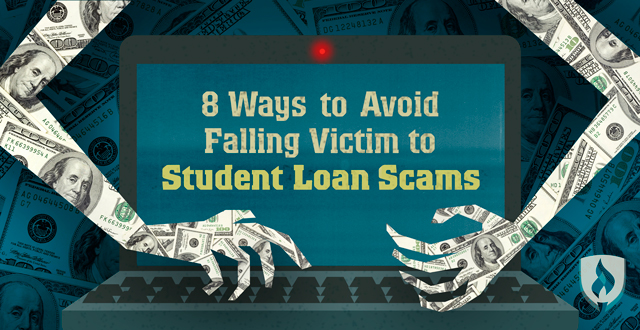
They lurk in the dark, seedy underworld of student loans. With a siren song of debt relief, they lure trusting, unsuspecting prey into their grasp. They’re student loan scammers, and they can’t wait to do business with you.
Let’s face it – navigating student loans and financial aid is tricky enough without these sharks in the water. So how can you protect yourself from falling victim to student loan scams?
We enlisted the experts to identify what red flags you should watch out for in the student loan sphere. Read ahead to arm yourself against scammers and protect your financial well being.
What types of student loan scams are out there?
Students are walking targets for scammers. They’re likely new to navigating student loans and they’re strapped for cash and overwhelmed with repayment options upon graduation. The promises of student loan scammers sound like music to students’ ears.
Here are the three of the most common scams students encounter:
- Consolidation scams: They promise to consolidate your many loans into one loan and payment.
- Advanced fee scams: They promise to lower the interest rates and monthly payment on your loans.
- Elimination scams: They promise to reduce your loans altogether.
What are some red flags to look out for?
Who wouldn’t love a lower interest rate on their student loans? Or to erase their debt entirely? Scammers will tell you anything you want to hear to gain your trust. Learn from financial experts about some telltale signs that suggest you’re being targeted in a student loan scam.
1. Be leery of quasi-government programs
Often student loan scams feature companies using names, seals and logos that give the impression they are affiliated with the federal government, according to Harrine Freeman, financial expert and CEO of H.E. Freeman Enterprises. This is an immediate cause for alarm because federal government and the Department of Education do not send out solicitations to encourage anyone to borrow money or consolidate loans.
Look out for buzzwords like “federal,” “government,” “national,” “American,” “hotline” or other official-sounding words in the company’s name. Don’t be fooled by these imposters, and remember that legitimate government websites will always have a .gov domain name.
2. Kick questionable addresses to the curb
Can you easily find this company’s mailing address? Does it seem like an authentic, brick and mortar address? If not, move on.
“We don't advise doing business with any company that doesn't provide a valid mailing address,” says Sally Elizabeth of PeopleClaim.com. She explains that many loan scammers will list a virtual office, such as a UPS store, or neglect to list an address altogether.
The email address can be a tip off as well. “If the company's email address is from a Google, AOL or a Hotmail account, run like hell!” she adds.
3. Flee from up-front fees
If you’re being asked to pay a fee up front, whether it’s a processing, administrative or consolidation fee to negotiate your student loan debt, move on. It’s a scam, according to Freeman.
Up-front fees to help with your debt are illegal in many cases. Legitimate lenders and student loan companies will only charge at the closing of the loan. Plus, their payment typically comes from the loan amount, which means it’s not actually out-of-pocket for you.
4. Ignore the in-your-face ads
Would a legitimate loan provider throw money into an advertising campaign on Facebook? Or commercials about lowering your interest on late-night television? What about a billboard? It doesn’t seem very likely.
If a company, seemingly federally-affiliated or not, is advertising online, on TV or on the radio, consider it a red flag. Genuine organizations don’t need to advertise to get business. They are well-known and can be found through colleges and universities, banks, financial institutions or credit counseling agencies, Freeman says.
5. Just say “No” to odd qualifications
Read the fine print and watch out for odd qualifiers.
They may only approve a lower interest rate if the loan balance meets a certain dollar amount. They may only lower the interest rate on the student loan if the borrower makes automated payments. If a payment is missed, they charge a penalty APR/interest rate which is a much higher interest rate, warns Freeman.
6. Don’t believe the too-good-to-be-true promises
"We’ll lower your monthly payments within 7 days!" "We’ll eliminate your loan balance completely!" "We’ll settle this for you immediately!"
Guarantees like these sound pretty impressive to a borrower’s ear, almost too impressive. Proceed with caution. Remember, student loans can almost never be discharged. You’ll find these promises simply won’t be met; but the scammers will gladly take your money in the meantime.
7. Run away from giveaways
It’s plain and simple: Legit companies don’t need to lure you in with perks. Lenders have plenty of business these days without spending their resources on signing bonuses.
If they offer incentives like free gift cards, credit cards, sweepstakes prizes or other freebies, Freeman advises you to look elsewhere.
8. Follow that funny feeling
If you just can’t put your finger on it, but something feels fishy, follow your instinct.
“If it feels like a scam, follow your gut. It probably is,” Freeman says.
So what can you do?
First, find out exactly which types of loans you currently have through the National Student Loan Data System. From there, Freeman suggests speaking directly with your lender if you are experiencing financial hardship.
Federal loan options
You can consolidate federal loans through the government without the help of a third party at no charge. Explore repayment options, such as income-based repayment or deferment if you are having trouble paying your loans.
Private loan options
For those with private loans, find legitimate private lenders to help with consolidation or refinancing for a new loan with a lower interest rate. Be sure to check with your state’s Attorney General or the Better Business Bureau to see if the company is worthy of your business.
The bottom line
Don’t believe the sweet talk of student loan scammers – they can’t keep their promises of resolving your debt.
Remember that unless your school closes, you become permanently disabled, or you pass away, federal loans cannot be discharged. Even bankruptcy cannot clear you of your repayments in most cases. Don’t fall victim to the false promises of student loan scams. Find a reputable source to keep your finances and your future secure.
Still have lingering questions about financial aid? Check out our article to find your answers: Your Most Pressing Financial Aid Questions Answered.




